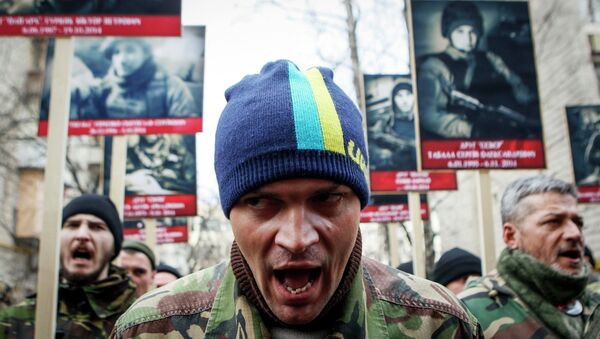There are various ways to bring down a government, according to Stratfor, a private US intelligence company, and the use of large-scale protests is just one such method; the success of a protest movement, however, is based on four pillars, and external support from "foreign governments" is one crucial factor.
"The success of protest movements often hinges on four key factors. The first is society's perception of the protest movement's grievances… The second important element is organizational capability… The third key factor is the strength of the government and its ability to rely on security forces to crack down on protesters… Finally, external support from foreign governments — whether direct support such as funding and training or indirect support such as encouragement — can strengthen protest movements," Stratfor's analysts underscored.
"Western governments — including the United States and Germany — had long invested resources in supporting the development of civil society in Ukraine. Some protest leaders, such as Klitschko, had close ties to Berlin. Several civil society groups that became involved in the protests also had longstanding ties to Western nongovernmental organizations and government institutions," the Stratfor report stated.
The distinguishing feature of the Ukrainian protests was the "violent resistance" practiced by far-right groups, emphasized the analysts. Together with "the protest movement's strong grievances, superior organization, and external encouragement," it had ultimately led to the collapse of Yanukovych's government.
Western governments have also been greatly involved in "mediating" between the government and opposition parties in Macedonia in 2015.
Curiously enough, Stratfor's analysts turned a blind eye to the fact that Albanian insurgents attacked the police in Kumanovo. Instead, the analysts insisted that Macedonia's authorities "cracked down" on "alleged ethnic Albanian militants."
They also remained silent about the alleged trigger point for the unrest — the unwillingness of Macedonian Prime Minister Nikola Gruevski to follow Western-backed sanctions against Russia.
The analysts claimed that Macedonia's protests eventually succeeded in bringing the Gruevski administration to the negotiation table.
"The main element that propelled change, however, was the involvement of outside governments. Direct mediation by Western officials, especially from the United States and the European Union, led to the negotiations for early elections," the analysts stressed.
According to the Stratfor report, the failure of Hungary's protest movement can be explained by the fact that the country's opposition is fragmented, while Orban's government has worked to consolidate its power during the last several years. Furthermore, "there has been no direct external effort to facilitate a change in government," emphasized Stratfor's analysts.
Highlighting the role of the EU and the US in large-scale protests in Central and Eastern Europe, the Stratfor report indicates that the recent protest movements have been used by the West to either oust undesirable governments or pressure them into following the Western political agenda. Moreover, the analysts do not focus on whether or not the ousted governments were democratically elected, and they present protests as a "legitimate" way for a regime change.





